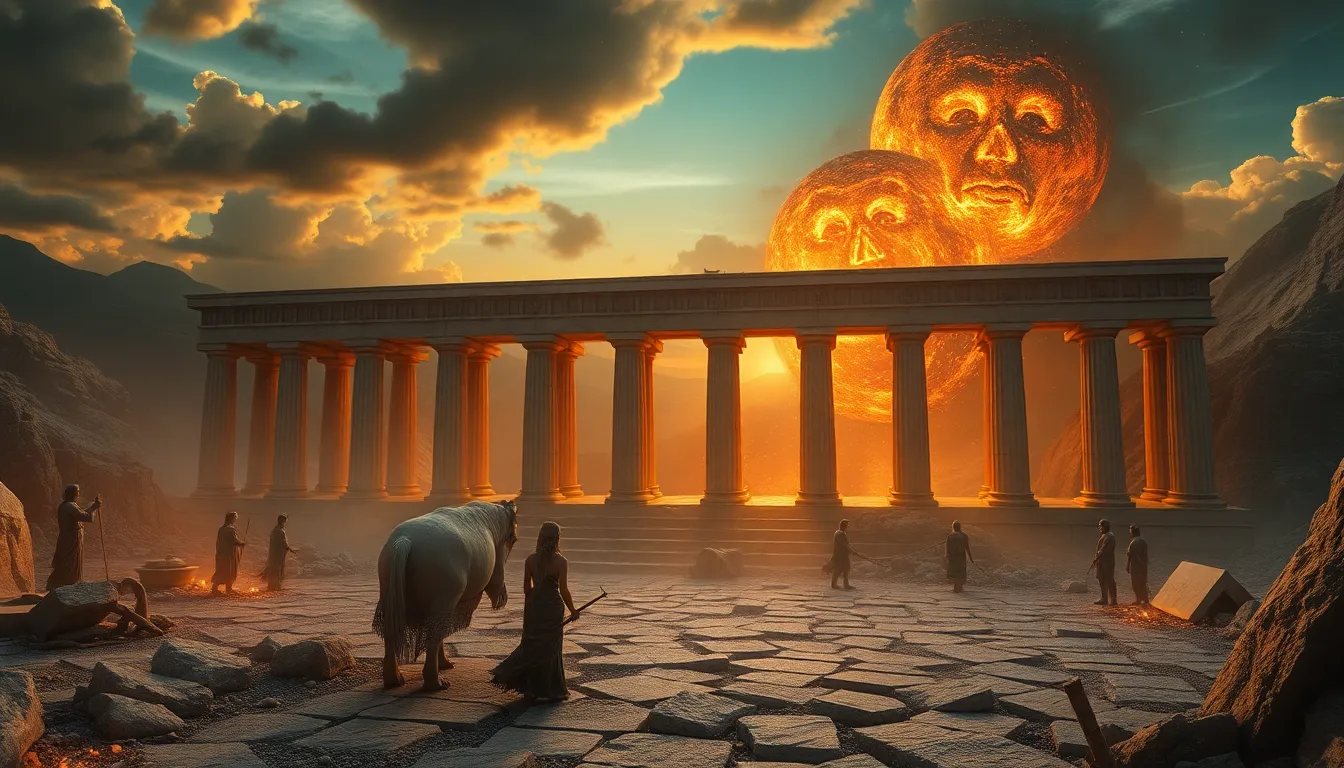Chaos to Cosmos: The Role of Chaos in Greek Creation Stories
I. Introduction
Greek mythology is a rich tapestry of stories that have shaped ancient culture and continue to influence modern thought. These myths serve not only as entertainment but also as a framework for understanding the world and human existence. Among the most intriguing aspects of these myths is the concept of Chaos, which plays a crucial role in the creation narratives of Greek mythology.
In the context of Greek creation stories, Chaos is defined as the primordial void or disorder from which the universe emerged. It is often depicted as an empty space, a formless nothingness, yet it is also the source of all potential and creation. This article aims to explore the role of Chaos in shaping the cosmos, examining its significance and implications in Greek mythology.
II. Understanding Chaos in Greek Mythology
Chaos is described as a primordial entity, one of the first beings to exist in the universe. It is not merely an absence of order; rather, it is a state teeming with potentiality. In many ways, Chaos represents the initial state of the universe before the emergence of structured existence.
When comparing Chaos to other mythological creation concepts, we find both similarities and differences. For instance, in Mesopotamian mythology, the chaos is embodied in the form of Tiamat, a dragon-like figure representing primordial chaos and disorder. In contrast, the Greek concept of Chaos is more abstract, emphasizing emptiness and potential rather than a tangible entity.
The significance of Chaos in the cosmic order cannot be overstated. It serves as the foundation upon which the structured universe is built, illustrating the transition from disorder to order—a theme that resonates throughout Greek mythology.
III. Key Greek Creation Myths Featuring Chaos
One of the most renowned sources for Greek creation myths is Hesiod’s “Theogony.” This epic poem provides a systematic account of the origins of the gods and the universe, starting from Chaos. In Hesiod’s narrative, Chaos is the first being, followed by several primordial deities who emerge from it.
The role of Chaos in Hesiod’s narrative is pivotal; it sets the stage for the creation of the cosmos and the emergence of divine beings. From Chaos came Gaia (the Earth), Tartarus (the Abyss), and Eros (Love), among others. These entities represent different aspects of existence and contribute to the formation of the universe.
Variations in Chaos representation can be found in other myths. For example, in Orphic tradition, Chaos is often depicted as a more dynamic force, incorporating elements of creation and destruction, which reflects the complexities of the universe.
IV. The Emergence of the Cosmos from Chaos
The process of creation from Chaos is a fascinating journey. Initially, there is only darkness and emptiness, but from this void, the first elements of the universe begin to emerge. The primordial deities—such as Gaia, the personification of the Earth, and Eros, the embodiment of love and attraction—begin to shape the cosmos.
As these deities come into being, they establish the foundations of the world. For example:
- Gaia: Represents the Earth and is the mother of all life.
- Tartarus: Represents the abyss and serves as a place of punishment and darkness.
- Eros: Embodies love and desire, facilitating creation and connection among beings.
The transition from disorder to order is a recurring theme in these myths, illustrating how the cosmos evolves from a state of formlessness into a structured and harmonious existence.
V. Symbolism of Chaos in Greek Thought
Chaos symbolizes both potential and creativity. It represents the infinite possibilities that exist before creation, emphasizing the idea that from nothingness can arise something magnificent. This duality of Chaos—being both a source of creation and destruction—reflects the complexities of existence.
The philosophical implications of Chaos in ancient Greek thought are profound. Philosophers like Heraclitus viewed chaos as a necessary component of change, arguing that the universe is in a constant state of flux. This perspective aligns with the notion that order can only arise from chaos, highlighting the balance between the two forces.
VI. Chaos and Human Experience
Chaos also reflects human emotions and experiences. The turmoil of Chaos can be seen as a metaphor for the conflicts and struggles individuals face in life. Many Greek myths depict characters encountering chaos in their journeys, representing personal and societal conflicts.
For instance, the trials of heroes often involve navigating through chaos to achieve order and harmony. This journey serves as a lesson about resilience and the necessity of confronting chaos in order to find balance and purpose in existence.
VII. Comparative Analysis with Other Cultures
When examining chaos concepts across cultures, we find both similarities and differences. Many ancient cultures, such as the Egyptians and the Chinese, also have creation myths that begin with a state of chaos or formlessness. However, the interpretations and representations of chaos vary significantly.
The influence of Greek chaos narratives can be seen in other mythologies, particularly in the way they emphasize the transformation from chaos to order. Modern interpretations of creation stories often draw from these ancient myths, showcasing the enduring relevance of chaos as a theme in understanding the universe.
VIII. Conclusion
In summary, Chaos plays a pivotal role in Greek creation stories, serving as the foundation from which the cosmos emerges. The lasting impact of these myths continues to shape contemporary understanding of creation and existence. The balance between chaos and order remains a central theme in both mythology and philosophy, inviting reflection on the nature of the universe and our place within it.
Ultimately, Chaos reminds us of the potential for creation that lies within disorder, encouraging us to embrace both chaos and order in our lives.




